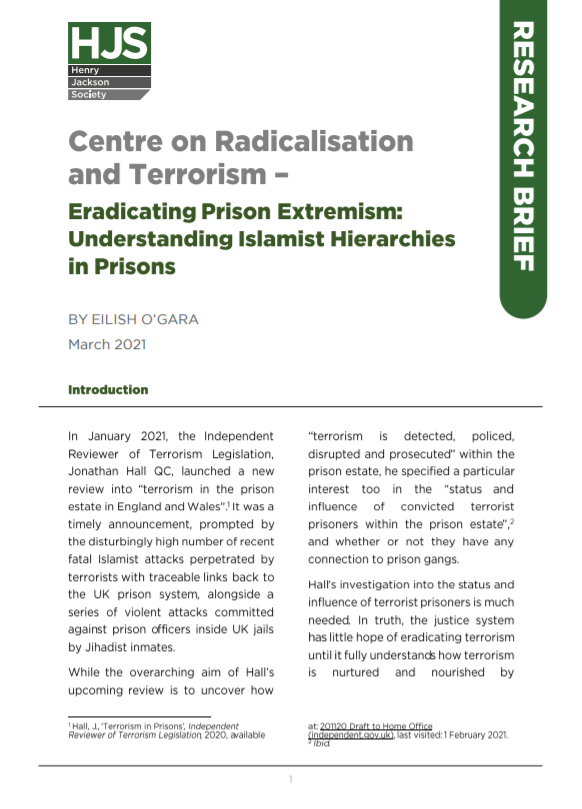Research Brief
‘Eradicating Prison Extremism: Understanding Islamist Hierarchies in Prisons’
By Eilish O’Gara, Research Fellow
March 2021
Introduction:
“In January 2021, the Independent Reviewer of Terrorism Legislation, Jonathan Hall QC, launched a new review into “terrorism in the prison estate in England and Wales”. It was a timely announcement, prompted by the disturbingly high number of recent fatal Islamist attacks perpetrated by terrorists with traceable links back to the UK prison system, alongside a series of violent attacks committed against prison officers inside UK jails by Jihadist inmates.
While the overarching aim of Hall’s upcoming review is to uncover how “terrorism is detected, policed, disrupted and prosecuted” within the prison estate, he specified a particular interest too in the “status and influence of convicted terrorist prisoners within the prison estate”, and whether or not they have any connection to prison gangs.
Hall’s investigation into the status and influence of terrorist prisoners is much needed. In truth, the justice system has little hope of eradicating terrorism until it fully understands how terrorism is nurtured and nourished by extremist actors and the networks they are able to build in prisons.
Drawing on both research fieldwork and the author’s own professional experience working within counter-terrorism in prisons, this briefing will focus on the sources of radicalisation across the high-security prison estate. It will identify the most dangerous terrorist offenders and explain why they often hold such an elevated status. It will look at the hierarchical networks built by terrorism-related prisoners, and the loyal, dedicated following they amass. It will map the trail of extremism descending down through Islamist hierarchies, highlighting the different roles played by prisoners. Throughout, it will discuss the impact Islamist hierarchies have on prisoners, staff and their wider threats to British national security.
The briefing will argue that the dispersal of highly influential terrorist offenders across the prison estate is dangerous for our penal system. It is important that they are removed from general circulation and their radicalisation tactics halted. Broad box-ticking de-radicalisation programmes will not suit every terrorism offender, nor are they currently working. Only by truly understanding the dynamics and the individual roles played within Islamist hierarchies, can we be swift at detecting and dismantling them, through the removal of key players.”
About the author:
 Eilish O’Gara
Eilish O’Gara
Eilish O’Gara is an experienced counter-terrorism analyst, who has spent the last five years working in UK Counter Terrorism. Working across the country, she undertook analytical training from both the UK Cabinet Office and the FBI. She has extensive counter-terrorism research experience from both the private and public sector, leading on a variety of strategic thematic areas and in priority operations.
She is a History graduate from Queen’s University in Belfast, having also studied Social Anthropology and Women’s History at the University of New South Wales, Australia. In addition, she holds a MA in Intelligence and International Security Studies from King’s College London, specialising in counter-radicalisation and British diplomacy studies.
Previously, Eilish has worked across a wide range of sectors, including the media, political risk analysis, and freelance writing.
Her expertise is in home-grown extremism, Islamist fundamentalism, and lone-actor terrorism.



